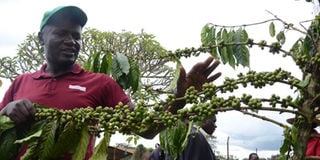Naro new coffee varieties give hope to farmers

A farmer checks his coffee berries for pests. Photo by Kelvin Atuhaire
What you need to know:
- Dr Emmanuel Iyamulemye Niyibigira, the director Uganda Coffee Development Authority (UCDA) says UCDA has resorted to supplying resistant breeds to farmers.
As the specialised coffee experts, the National Coffee Research Institute (NaCORI) has had an incredible presence in the coffee industry.
Since the reported first outbreak of the dreaded Coffee Wilt Disease (CWD) that destroyed an estimated 56 per cent of Robusta coffee, the National Agricultural Research Organisation (Naro), has been at the frontline of research.
In the 1980s, efforts were on high yielding varieties but in 2014, a successful program led to the introduction of new coffee cultivars that are resistant to CWD with a high yield potential said to double that of the current varieties.
NaCORI announced on Saturday during the Farm Clinic at Kituuza in Mukono District that they had developed three new CWD resistant varieties, with a team of experts that have been testing the prototypes since 2017.
Pascal Musoli, the chief coffee breeder at NaCORI said seed is the most important aspect in developing new crop varieties. “We have tested this breed and it passes with flying colours. Farmers will greatly benefit,” Musoli said.
What is new in the new breeds?
The new breeds are Naro-Kituuza Robusta KR8, KR9 and KR10. Although they share similar attributes, KR10 is the benchmark of the new varieties.
Researchers said the variety has an excellent yield amounting to 4,800 kilogramme of hulled coffee per hectare per year, which could earn a farmer Shs26.4m. KR10 is also eight-times more yielding than traditional varieties yet it is resistant to coffee wilt disease, leaf rust and red blister. Musoli added that KR10 has an excellent cup quality with good flavour and taste.
The bean quality is visibly bigger and Musoli recommends that it can grow in all areas suitable for Robusta coffee growing.
The Robusta coffee plant is a resilient type compared to Arabica and can grow in low altitude areas up to 1,200 metres above sea level. It can withstand hot temperatures and full sun. But Musoli cautioned that the new varieties do not thrive in swamp and murram soils.
KR9 too, has an excellent yield of 3,890 kilogrammes of hulled coffee per hectare, which earns about Shs21m per annum and is six-times more yielding than the traditional varieties while it has other attributes of the superior KR10.
KR8 on the other hand, can earn for the farmer Shs17.2m per hectare and is five-times more yielding.
Why new varieties
Coffee is among the most traded commodities in the world after oil. It is the most important export from Uganda contributing between 20-30 per cent in terms of foreign exchange earnings to the Uganda economy.
Europe still accounts for almost one third of the coffee consumed worldwide, but China, the world’s second biggest economy after the US, has doubled its consumption in just the last five years.
Either way, the strong demand is putting more pressure on coffee-producing countries.
However, climate change and its associated effects, are posing a real threat to coffee’s global success story. Most experts agree that the future of coffee is significantly at risk due to climate change.
It is estimated that 50 per cent of the land used to grow coffee globally will not be farmable by the year 2100.
But Dr Imelda Kashaija, who is also the deputy director-general in charge of agriculture technology promotion at NaCORI, explains that as temperatures warm, pests and diseases continue to invade coffee farms. “Since more than 80 per cent of coffee growers are poor farmers in urban areas, they will be faced with decreasing crop yield or increased pesticides. Ultimately, the quality and production of coffee will suffer. That is why we must develop varieties that can withstand those challenges,” Kashaija said.
Dr Emmanuel Iyamulemye Niyibigira, the director Uganda Coffee Development Authority (UCDA) says UCDA has resorted to supplying resistant breeds to farmers. He says that more than 50,000 resistant cuttings are supplied to the authority on an annual basis to propagate to farmers and Operation Wealth Creation (OWC) programme. The new varieties are still available at NaCORI and selected seed suppliers. The current price of each seedling is Shs1,500. What’s clear is that the coffee industry, with an economic impact of more than $492m to the economy, will face significant challenges in the future.
Coffee drinkers may be faced with higher coffee prices and poorer tasting coffee as climate change continues to strain this vulnerable crop. This makes research an invaluable addition.
Concerns
Richard Ssemakula, a farmer who attended the Farm Clinic said the new varieties will enable them remain in business.
But he was concerned with the lower quality cultivars seed breeders supply. Dr Kashaija responded to the concerns of farmers by advising farmers by advising farmers to buy from approved breeders.
Uganda’s coffee production
(000’ 60kg bags)
2015 - 3,650
2016 - 4,962
2017 - 4,797
2018 - 4,900
Source: International Coffee Organisation




